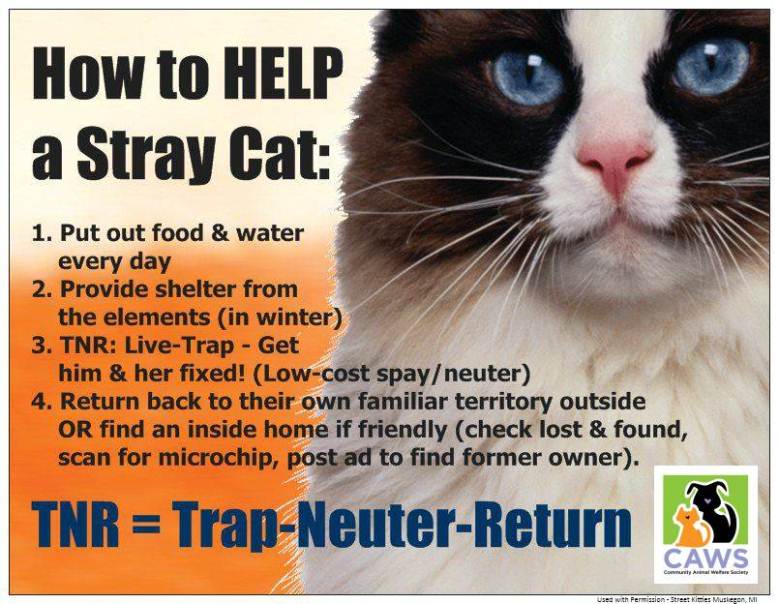Community Cats
Acting Locally
Community or feral cats are generally considered to be those cats that are not tame or socialized. They may have been abandoned or were born to abandoned cats. They usually live short, miserable lives. These cats struggle to survive and are often seen as “problem” animals to be “gotten rid of”. As a result, they rarely have the recognition and protection in a community that pets have.
Many people feed these cats. Feeding feral cats as an act of kindness is not enough and it can ultimately result in more unwanted kittens and more suffering. Instead, caretakers are encouraged to use a “fix and release” approach, often referred to as TNR:
Trap (Humanely) > Neuter (Spay/Neuter) > Return
This program can encourage community tolerance of feral TNR cats and recognition of responsible TNR programs. Although not perfect, the number of feral cats is reduced, and TNR ferals have a kinder, healthier life. Nationally, organizations involved in feral cat care report that feral cat colonies maintained under a TNR program help with the following:
- Stabilize in numbers
- Protect their territories
- Does not attract additional animals

These groups of cats also have significantly fewer or no problems with fighting, spraying, and other unwelcome behaviors often associated with “strays”. This has been CAWS’ experience with local feral colonies, too.
What about simply “removing” the cats? Feral cats tend to find areas where food is available, such as around dumpsters. Other cats which are unaltered will likely move in and reproduce, starting the cycle again.
CAWS recognizes that TNR is not an appropriate approach in all situations. The cats’ area must be safe for the animals (and the volunteer), and consent of the property owner is necessary.
In areas where the program has been successful, property owners and neighbors are much more supportive when they are aware that the animals are “fixed”, and cared for responsively rather than creating a feeder-breeder situation.
CAWS greatly appreciates the support of businesses in Salt Lake City that have graciously agreed to allow CAWS volunteers to maintain TNR feral colonies on their properties.
Long-term Goals
If you do feed feral cats, or know someone who feeds ferals, please make sure the care reduces the feral cat problem. Make sure there is extra effort expended up front to create a TNR program for the long-term well-being of the cats.
For further information regarding TNR, visit the Feral Cat Coalition or Alley Cat Allies. For local information, including humane traps for loan, participating veterinarians, feeding stations, winter shelters, and helpful hints on how to get it done, contact CAWS at (801) 328-4731, or send an E-mail to [email protected].
